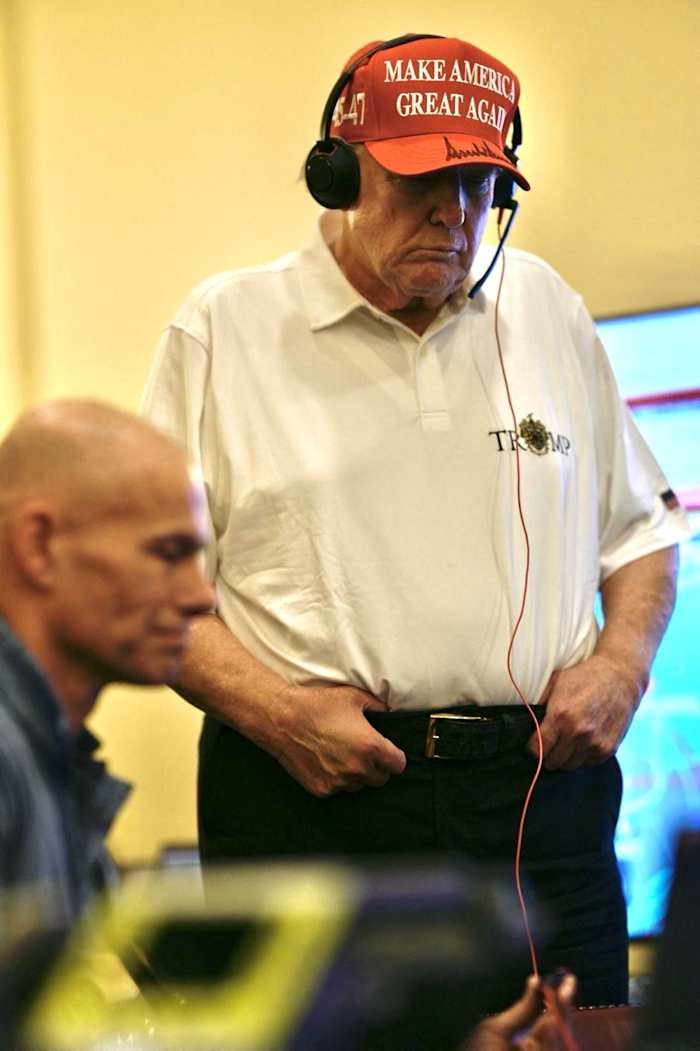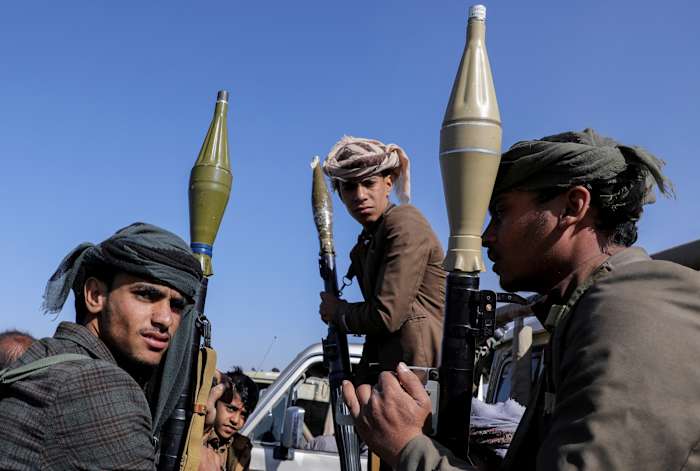Middle East
Trump unleashes fury on Houthis
US President Donald Trump has launched large-scale military strikes against Yemen's Iran-aligned Houthis over the group's attacks against Red Sea shipping, killing at least 31 people at the start of a campaign expected to last many days.
Trump also warned Iran, the Houthis' main backer, that it needed to immediately halt support for the group. He said if Iran threatened the United States, "America will hold you fully accountable and, we won't be nice about it!"
The unfolding strikes - which one US official told Reuters might continue for weeks - represent the biggest US military operation in the Middle East since Trump took office in January. It came as the United States ramped up sanctions pressure on Tehran while trying to bring it to the negotiating table over its nuclear program.
"To all Houthi terrorists, YOUR TIME IS UP, AND YOUR ATTACKS MUST STOP, STARTING TODAY," Trump posted on his Truth Social platform.
At least 31 were killed and 101 others injured in the US strikes, mostly from women and children, Anees al-Asbahi, spokesperson for the Houthi-run health ministry said in an updated toll on Sunday.
The Houthis' political bureau described the attacks as a "war crime."
"Our Yemeni armed forces are fully prepared to respond to escalation with escalation," it said.
Residents in Sanaa said the strikes hit a building in a Houthi stronghold.
"The explosions were violent and shook the neighbourhood like an earthquake. They terrified our women and children," said resident Abdullah Yahia.
Strikes also targeted Houthi military sites in Yemen's southwestern city of Taiz, two witnesses in the area said on Sunday.
Another strike on a power station in the town of Dahyan in Saada led to a power cut, Al-Masirah TV reported early on Sunday. Dahyan is where Abdul Malik al-Houthi, the enigmatic leader of the Houthis, often meets his visitors.
The Houthis, an armed movement that took control of most of Yemen over the past decade, have launched scores of attacks on ships off its coast since November 2023, disrupting global commerce and setting the US military on a costly campaign to intercept missiles and drones that have burned through stocks of US air defenses.
A Pentagon spokesperson said the Houthis have attacked US warships 174 times and commercial vessels 145 times since 2023. The Houthis say the attacks are in solidarity with Palestinians over Israel's war in Gaza with Hamas militants.
Iran's other allies, Hamas and Hezbollah in Lebanon, have been severely weakened by Israel since the start of the Gaza conflict. Syria's Bashar al-Assad, who was closely aligned with Tehran, was overthrown by rebels in December.
But throughout, Yemen's Houthis have remained resilient and often on the offensive, sinking two vessels, seizing another and killing at least four seafarers in an offensive that disrupted global shipping, forcing firms to reroute to longer and more expensive journeys around southern Africa.
The US administration of then-President Joe Biden had sought to degrade the Houthis' ability to attack vessels off its coast but limited the US actions.
US officials, speaking on condition of anonymity, say Trump has authorized a more aggressive approach.
Strikes across Yemen
The strikes on Saturday were carried out in part by fighter aircraft from the Harry S. Truman aircraft carrier, which is in the Red Sea, officials said.
The US military's Central Command, which oversees troops in the Middle East, described Saturday's strikes as the start of a large-scale operation across Yemen.
"Houthi attacks on American ships & aircraft (and our troops!) will not be tolerated; and Iran, their benefactor, is on notice," Defense Secretary Pete Hegseth wrote on X. "Freedom of Navigation will be restored."
Trump held out the prospect of far more devastating military action against Yemen.
"The Houthi attack on American vessels will not be tolerated. We will use overwhelming lethal force until we have achieved our objective," Trump wrote.
Iran's Foreign Minister Abbas Araqchi said the US government had "no authority, or business, dictating Iranian foreign policy."
"End support for Israeli genocide and terrorism. Stop killing of Yemeni people," he said in an X post on early Sunday.
Iran's mission to the United Nations did not immediately respond to a request for comment.
Smoke rises from site of strike on Yemeni capital Sanaa. – Reuters
On Tuesday, the Houthis said they would resume attacks on Israeli ships passing through the Red Sea and Arabian Sea, the Bab al-Mandab Strait and the Gulf of Aden, ending a period of relative calm starting in January with the Gaza ceasefire.
The US attacks came just days after a letter to Iran's Supreme Leader Ayatollah Ali Khamenei from Trump was delivered, seeking talks over Iran's nuclear program.
Khamenei on Wednesday rejected holding negotiations with the United States.
Still, Tehran is increasingly concerned that mounting public anger over economic hardships could erupt into mass protests, four Iranian officials told Reuters.
Last year, Israeli strikes on Iranian facilities, including missile factories and air defenses, in retaliation for Iranian missile and drone attacks, reduced Tehran's conventional military capabilities, according to US officials.
Iran has denied wanting to develop a nuclear weapon. However, it is dramatically accelerating the enrichment of uranium to up to 60% purity, close to the roughly 90% weapons-grade level, the U.N. nuclear watchdog - the International Atomic Energy Agency - has warned.
President Trump looks on as military strikes take aim at Yemen. – Reuters
Western states say there is no need to enrich uranium to such a high level under any civilian program and that no other country has done so without producing nuclear bombs. Iran says its nuclear program is peaceful.
In an apparent sign of US efforts to improve ties with Russia, Secretary of State Marco Rubio spoke on Saturday with Russian Foreign Minister Sergei Lavrov to inform him about the US strikes in Yemen, the State Department said.
Russia has relied on Iranian-provided weaponry in its war in Ukraine, including missiles and drones, US and Ukrainian officials say.
Who are Yemen's Houthis and why are they under attack by the US?
What is the history of the Houthis?
In the late 1990s, the Houthi family in the far north of Yemen set up a religious revival movement for the Zaydi sect of Shi'ite Islam, which had once ruled Yemen, but whose northern heartland had became impoverished and marginalised.
As friction with the government in the capital Sanaa grew, they fought a series of guerrilla wars with the national army and a brief border conflict with Sunni Muslim Saudi Arabia.
Who is the Houthi leader?
Abdul Malik al-Houthi created the defiant force challenging world powers from a group of ragtag mountain fighters in sandals. Al-Houthi established a reputation as a fierce battlefield commander before emerging as head of the Houthi movement.
Under the direction of al-Houthi, who is in his 40s, the group has grown into an army of tens of thousands of fighters and acquired a huge arsenal of armed drones and ballistic missiles. Saudi Arabia and the West say the arms come from Iran, though Tehran denies this.
Al-Houthi is known for rarely staying long in one place, for never meeting the media and for extreme reluctance to make scheduled public appearances.
How did the Houthis come to control much of Yemen?
A civil war erupted in Yemen in late 2014 when the Houthis seized Sanaa. Worried by the growing influence of Shi'ite Iran along its border, Saudi Arabia led a Western-backed coalition in March 2015, which intervened in support of the Saudi-backed government.
The Houthis established control over much of the north and other large population centres, while the internationally recognised government based itself in the port city of Aden.
Yemen enjoyed a period of relative calm amid a UN-led peace push, but a sharp escalation in regional tensions since the start of the Gaza war has increased risks of a new conflict between the militia and Riyadh.
Why attack ships?
The Houthis have waded into the Gaza conflict with attacks on shipping routes in the Red Sea as a show of support for the Palestinians and Hamas, the Islamist group that controls Gaza.
They have also claimed attacks on ships they say are linked to Israel in the Gulf of Aden, the Arabian Sea, the Indian Ocean and the Mediterranean Sea.
The Houthi attacks have disrupted global shipping, forcing firms to re-route to longer and more expensive journeys around southern Africa.
While the militia has said it attacked only vessels with links to Israel, the United States and Britain, shipping industry sources say all ships were at risk.
The US and Britain had retaliated with air strikes against the Houthis as part of international efforts to restore the free flow of trade along a key route between Europe and Asia that accounts for about 15 per cent of the world's shipping traffic.
A period of relative calm started in January alongside the Gaza ceasefire but the group then warned in March it would resume its naval operations if Israel did not lift a blockage of aid into Gaza.
The Houthis then announced on March 12 a resumption of attacks with immediate effect.
What are the Houthis' links with Iran?
The Houthis are part of what has been called the "Axis of Resistance" – an anti-Israel and anti-Western alliance of regional militias including Hamas, Hezbollah and the Houthis, backed by Iran.
The Houthis' slogan is "Death to America, Death to Israel, curse the Jews and victory to Islam".
The Saudi-led coalition accuses Tehran of arming and training the Houthis, a charge both deny. The coalition also says Lebanon's Iran-backed Hezbollah is helping the Houthis, an accusation it rejects.
While Iran champions the Houthis, the Houthis deny being puppets of Iran, and Yemen experts say they are motivated primarily by a domestic agenda.










